My guest today is Theo Gangi, the Director of the writing program at St Francis College. His stories have been anthologized in First Thrills, edited by Lee Child, The Greensboro Review, The Columbia Spectator and the Kratz Sampler. His articles and reviews have appeared in Buzzfeed.com, The San Francisco Chronicle, Mystery Scene Magazine, Inked Magazine and Crimespree Magazine. Theo and I first met in NYC when our books debuted in 2008 at ITW’s Thrillerfest. I’ve enjoyed his gritty writing ever since. Please welcome Theo, TKZers.
A New Day, A New Genre
I admit it– the inspiration for my new novel A New Day in America was not mine initially. The somewhat notorious writer James Frey approached me with the idea for the tale of Nostradamus Greene and his daughter Naomi: a post-apocalyptic father-daughter survival story.
If I’d had a project I was in love with at the time, I’m not sure how I would have reacted. Screenwriters are accustomed to inheriting ideas and collaborating, but the mythology of the Novelist is the lone, solitary storyteller. However, once I found an inspiration to draw on, the work became mine as much as anything I’ve written.
The post-apocalyptic world—the desolate lands, the loss of the structure of civilization, the father who braves survival, and the daughter who has seen too much—recalled a story from my formative years.
Apocalypse stories, while set in the future, are actually a return to the past. The time after modern civilization would resemble the time before it. The landscape of feudal Japan felt just right. Samurai assassin Itto Ogami and his son Daigoro serve as a great model for Nostradamus Greene and Naomi. Doing some sketches, I even found some visual symmetry. The paradox of the killer-father character has a brutal simplicity. A man with a gun is a killer. A man with a gun and a child at his back is a hero.
The idea was freeing for a couple of reasons. For one, I had some much-needed simplicity, and in the past I’ve had a tendency to over-complicate my work. Second, I got to play with reality itself.
My first book, Bang Bang, is a hardboiled, botched-robbery sort of urban crime thriller. While the hero’s ability to rack up a body count of a dozen or so in a single night might stretch the realm of reality, the book is firmly set in the real world. For A New Day in America, writing in a post-apocalyptic world meant I could create the whole thing. I had to invent setting, history, events, and the all-important rules.
As a writer I always saw craft as a kind of minimalist-vs-maximalist approach. My biggest influence was Elmore Leonard, who famously didn’t write the parts the reader ‘skips anyway’, and once said he read Hemingway every morning before writing, to get the feel of reduction in his writing process. I love Dashiell Hammett, whose minimal approach to books like Red Harvest and The Maltese Falcon would’ve made Hemmingway proud (‘The stuff that dreams are made of’ is an invention of filmmaker John Houston, and far too sentimental for Hammett). The idea being, don’t waste the reader’s time and attention on an eloquent description of a back alley, because the reader know what a alley looks like, and wants to know what your characters will do and say, not that there’s a garbage can that’s tipped over, or a couple of chicken bones in the gutter. The empty spaces of great noir are poetic in and of themselves.
When writing in a world that has suffered a recent apocalypse, you can’t get away with that approach. If you allow the reader the space to fill in your apocalyptic world, they will likely visualize some stock imagery from this movie or that. Mel Gibson will poke his head out of a tricked out Mad Max vehicle in the background. A zombie might appear in the reader’s imagination even though there are no zombies in your book. To write in a speculative world is to build one. Visuals such as a New York City skyline that looks like a king’s crown—skyscrapers line the outer rim, but nothing stands within.
The process required quite a bit of overwriting and then cutting, so the sense of the world was greater than the word count. World building aside, the fundamentals are the same as any kick-ass thriller: Danger, conflict, bravery, human connectivity and impossible choices. The America that’s reduced to rubble offers a vehicle for the same challenges that the best thriller heroes endure—back to the wall, knife to the throat, what do you do? How do you find a way to assert yourself on a world that’s gone to hell? Is your next move moral or practical? Can you save them all? Can you save the ones that matter most?
The apocalyptic scenario creates a series of Sophie’s Choice sorts of situations. I’ll relate it this way– say there’s a train bearing down the tracks full of ten innocent people. The track forks: one way is a brick wall. The other way is your child tied to the rails. You stand at the switch. Which do you chose?
I imagine most people would chose to save their child, as I would. But what if there’s 100 people on that train? 1,000? A New Day in America is about a father who makes the decision to save his child over and over again.
Question 1: TKZ Question for Discussion: If you could take a few non-essential luxuries in your survivalist bunker, what would they be?

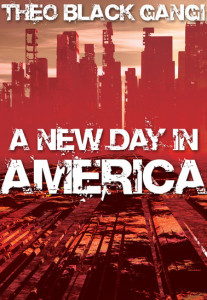
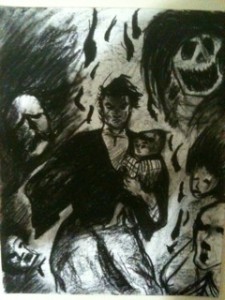
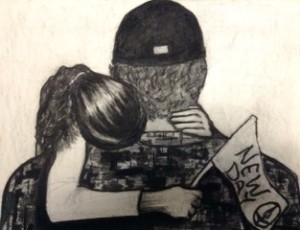
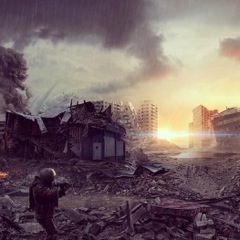

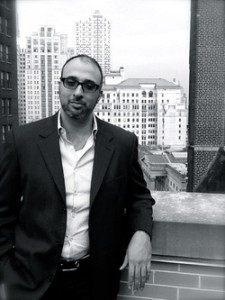
Welcome to TKZ, Theo. I had just moved to Oklahoma when I experienced a terrible night of tornadoes. 50 tornadoes touched down, as I recall, destroying homes and lives. The next day I ordered an underground shelter. My circumstance, of stocking the shelter for a few days to a week, was very much different than what your character, Nos, goes through.
I had the pleasure of reading your gritty, intense book and loved that even though the world had changed into a dark, bleak place, the love between a father and daughter became the backbone to your story. That gave hope that humanity has a chance to restore a world worth living in.
Thanks for being our guest, Theo.
Thank you so much Jordan! I really appreciate the welcome. And you’re right– bleak as the world is, it’s about the will to survive that endures by way of the father’s devotion to his daughter.
It’s a pleasure to have such a talented writer as a reader and it’s very gratifying got what I was going for.
Pickin’ up what I’m layin’ down?
Welcome, Theo! In my survival bunker I’d want a mirror, a hairbrush and my makeup bag as my nonessential luxuries, lol. Just so I don’t go too far down the “gritty” road! 🙂
Ha! I could totally see you glamed up in your fraidy hole, Kathryn.
In my storm shelter, we did practice runs with our neighbors who had small children, so they could use our shelter too. We ended up sharing our shelter with a crab, a snake, and a few pet lizards. No room for makeup. We also talked about a hand cranked blender for bloody marys. #Essentials
It’s better to look good than to feel good, dahling.
The artwork in your post and on your website is very unique, Theo. It looks as if it were made especially for your book. I’d love to know more about it.
The black and white (charcoal) drawings I did for the book. Those nice saturated apocalyptic landscapes are courtesy of ‘Google image search’ lol. Some fit rather nicely.
Not sure how I’d power a record player, so I’d settle for my guitar… and extra strings, of course (though that would be a good “quest” for a hero, maybe…)
As to writing something not my idea ~ not a book, but a couple of songs… (Alas, none that you’d know… Yet…)
A guitar would definitely be nice. You could work on your original songs.
Yup, and with few to complain about my vocal ( in- )abilities…
Thank you for the post and for the questions, Theo.
The answers where whirling in my head, so I had to let them out. 😉
1. My Kindle, although it is actually and essential luxury. 🙂 Paper-backs and definitely several notebooks and pens. But again, these sound for me as essentials. 🙂
2. A good friend of mine told me about five times or more to write a book how my sister, I and our loved ones ended or rather started in Denmark. She is sure it can make a great novel. I agree it is a fun story, and I might write it some day.
My first novel is inspired by my father’s story. So, in a way also not my initial idea. 😉 It felt very inspiring, eye-opening and soothing to write it.
Aw thanks Victoria! Only problem with the kindle is that power supply is one of the most scarce resources. I read almost everything on my ipad, but you don’t need to charge a paperback!
I’ve been thinking in survivalist mode recently since my brother, who is a “Prepper”, gave me a knapsack full of supplies to grab in case of a disaster. I am also a fan of the TV show Revolution, wherein the electric power around the world went out. People were reduced to scrabbling for survival without electricity. This isn’t so far-fetched when you think about what a global EM pulse could do. What luxury would I want to keep? It might be vain, but I’d take some undereye concealer and caffeine drinks for that coffee boost. And a good book that I wouldn’t mind rereading.
Your bro is a prepper? Ha! Can’t hurt to be prepared.
If we’re talking bunker and there is space, there are few things that would be considered non-essential. Other than the basics (food, weapons, ammo, medicine, etc) anything and everything else can be used for barter. One of the greatest commodities after a fall (according to an acquaintance who survived the Yugoslav Civil War) is toilet paper and baby wipes. People will pay almost anything for a nice clean bottom. And if you’ve got what they need to do it, you will have access to just about anything you need.
Omg, Basil. Leave it to you to think of TP. It would raise in value, one sheet as a time